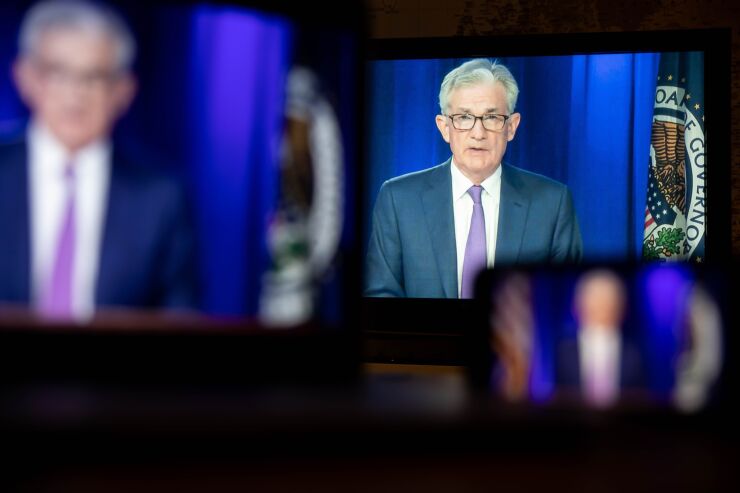WASHINGTON — The growing scrutiny of personal financial transactions by two Federal Reserve Bank presidents has demonstrated that the U.S. central bank could bolster its ethics framework for senior officials, Fed Chair Jerome Powell said Wednesday.
The Fed announced Sept. 16 that Powell had ordered a review of its ethics rules. A week earlier, Boston Fed President Eric Rosengren and Dallas Fed President Robert Kaplan said
Even though both presidents had said the transactions complied with the ethics rules, Powell said Wednesday that the controversy had shown that the central bank's framework is “clearly seen as not adequate to the task of really sustaining the public’s trust."
“We need to make changes and we're going to do that as a consequence of this,” he said. “This will be a thoroughgoing and comprehensive review. We're going to gather all the facts and look at ways to further tighten our rules and standards.”
Powell said he was not aware of Rosengren and Kaplan's trading last year that raised the questions about conflicts of interest.

“We understand very well that the trust of the American people is essential for us to effectively carry out our mission, and that's why I directed the Fed to begin a comprehensive review of the ethics rules around permissible financial holdings and activity by Fed officials,” Powell said during the press conference after a regular meeting of the Federal Open Market Committee.
Powell was also asked about his ownership of between $1.25 million and $2.5 million of municipal bonds, which were originally purchased prior to 2019. As part of the Fed’s response to the economic crisis caused by the pandemic last year, the central bank bought more than $5 billion in municipal bonds. (A Fed spokesperson
Powell said that municipal bonds “were always thought to be a pretty safe place for a Fed person to invest” because the Fed has never before purchased municipal bonds.
“It was a real coincidence I happened to pre-own these munis. They were bought many years ago actually,” Powell said. “It just was an unforeseen event and I couldn't sell them, so what I did was I just held them, checked with the ethics people and went ahead.”
The Fed has previously said that its ethics framework is consistent with that of other government agencies, and is in some cases even more severe.
Powell was also asked about who would take over the Fed’s regulation and supervision portfolio after the term for Vice Chair for Supervision Randal Quarles is set to end next month.
Powell didn’t offer any insight into whether Quarles would retain that portfolio or not after his term as vice chair expires Oct. 13. He acknowledged that a potential successor as vice chair, chosen by the Biden administration, could make changes to the Fed's supervisory and regulatory agenda.
“I respect that that's the person who will set the regulatory agenda going forward and I would accept that,” Powell said.
Many observers have posited that if President Biden chooses to renominate Powell as Fed chair, the White House could elevate Fed Gov. Lael Brainard to the vice chair for supervision role.
Brainard dissented on a number of rules that Powell voted in favor of during his time as chair,
Powell said he recognizes that Dodd-Frank charges the vice chair of supervision with setting the regulatory framework.
“It's fully appropriate for a new person to come in and look at the current state of regulation and supervision, and suggest appropriate changes and I welcome that,” he said.





